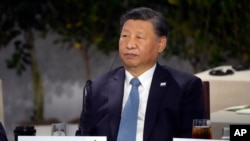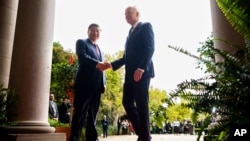Western foreign policy experts are welcoming recent U.S. agreements to jointly tackle foreign disinformation with Seoul and Tokyo, saying they are needed to counter Chinese efforts to undermine liberal democracies through the spread of fake news.
The U.S. signed a Memorandum of Cooperation with Japan in Tokyo on Wednesday "to identify and counter foreign information manipulation," according to a State Department statement.
The agreement follows a Memorandum of Understanding signed with South Korea in Seoul on Friday to cooperate in their efforts to tackle foreign disinformation. The agreements, the first designed to fight disinformation, were made during an Asia trip by Liz Allen, the U.S. undersecretary of state for public diplomacy and public affairs.
They are designed to "demonstrate the seriousness with which the United States is working with its partners to defend the information space," according to the State Department's Wednesday statement, which did not specify any nations as threats.
In response, Liu Pengyu, a spokesperson for the Chinese Embassy in Washington, told VOA on Tuesday that he wants to stress that "China always opposes the creation and spread of disinformation."
He said, "What I have seen is that there is a lot of disinformation about China on social media in the U.S. Some U.S. officials, lawmakers, media and organizations have produced and spread a large amount of false information against China without any evidence, ignoring basic facts."
The agreements the U.S. made with its allies are "a deliberate acknowledgment of the threats posed by China," said David Maxwell, vice president of the Center for Asia Pacific Strategy.
"Disinformation is part of a deliberate long-term political warfare campaign by China to subvert the democracies of the U.S., the ROK and Japan as well as to undermine the alliance relationships to prevent unified action against China," Maxwell said, using the acronym for South Korea's official name, Republic of Korea.
China is seemingly accelerating its social media operation aimed at influencing the U.S. election in 2024.
Meta, parent company of Facebook and Instagram, announced on Nov. 30 that it took down 4,789 Facebook accounts based in China that were impersonating Americans, including politicians, and posting messages about U.S. politics and U.S.-China relations.
In the report on adversarial threats, Meta said China is the third-most-common source of foreign disinformation after Russia and Iran.
Dennis Wilder, a senior fellow for the Initiative for U.S.-China Dialogue on Global Issues at Georgetown University, said, "The Chinese, Russians, and others seek to disrupt the normal give and take of our political discourse."
Wilder, formerly National Security Council director for China in 2004-05 during the George W. Bush administration, continued to say the agreements Washington made with Seoul and Tokyo are "a significant step forward" as "democracies must work together" to offset "disinformation designed to influence electorate and sow overall dissent within our open political systems."
Beijing appears to be spreading anti-U.S. and pro-China messages in South Korea as well.
South Korea's National Intelligence Service (NIS) announced Nov. 13 it had identified and taken down 38 fake Korean-language news sites operated by two Chinese public relations firms, Haimai and Haixun.
South Korea's National Cyber Security Center, which is overseen by NIS, released a report on the same day describing the kind of propaganda that the firms disseminated through the fake news sites by posing as members of the Korean Digital News Association. The organization oversees the copyrights of news articles posted by its members.
Using news site names such as Seoul Press with the corresponding domain name as seoulpr.com and Busan Online with busanonline.com, Haimai has been disseminating disinformation and operating the sites from China, according to the report. Busan is South Korea's second-largest city.
An article on Daegu Journal, another illicit site Haimai was running, stated in June that nuclear wastewater released from Japan would affect the South Korean food supply chain.
The National Cyber Security Center report also noted that U.S.-based cybersecurity firm Mandiant, owned by Google, released a report in July accusing Haimai of operating 72 fraudulent websites to spread anti-U.S. messages.
Cho Han-Bum, a senior research fellow at the Korea Institute for National Unification, told VOA's Korean Service on Tuesday that "China and North Korea have been attempting in various ways to influence South Korea's public opinion."
He said the influence campaign could affect South Korean politics and therefore Seoul's relations with Beijing or its stance on Pyongyang.
Kim Hyungjin in Seoul contributed to this report.





